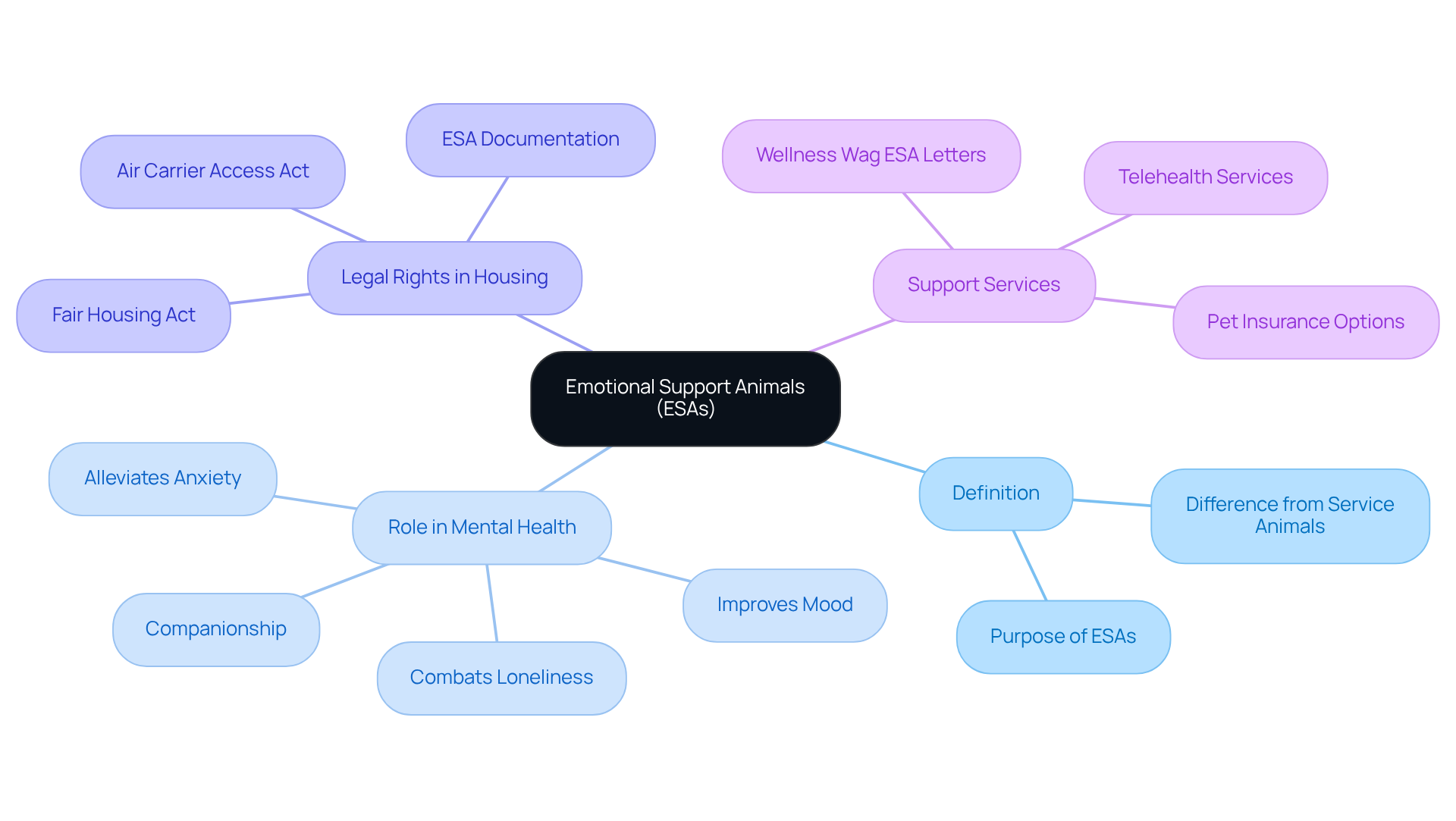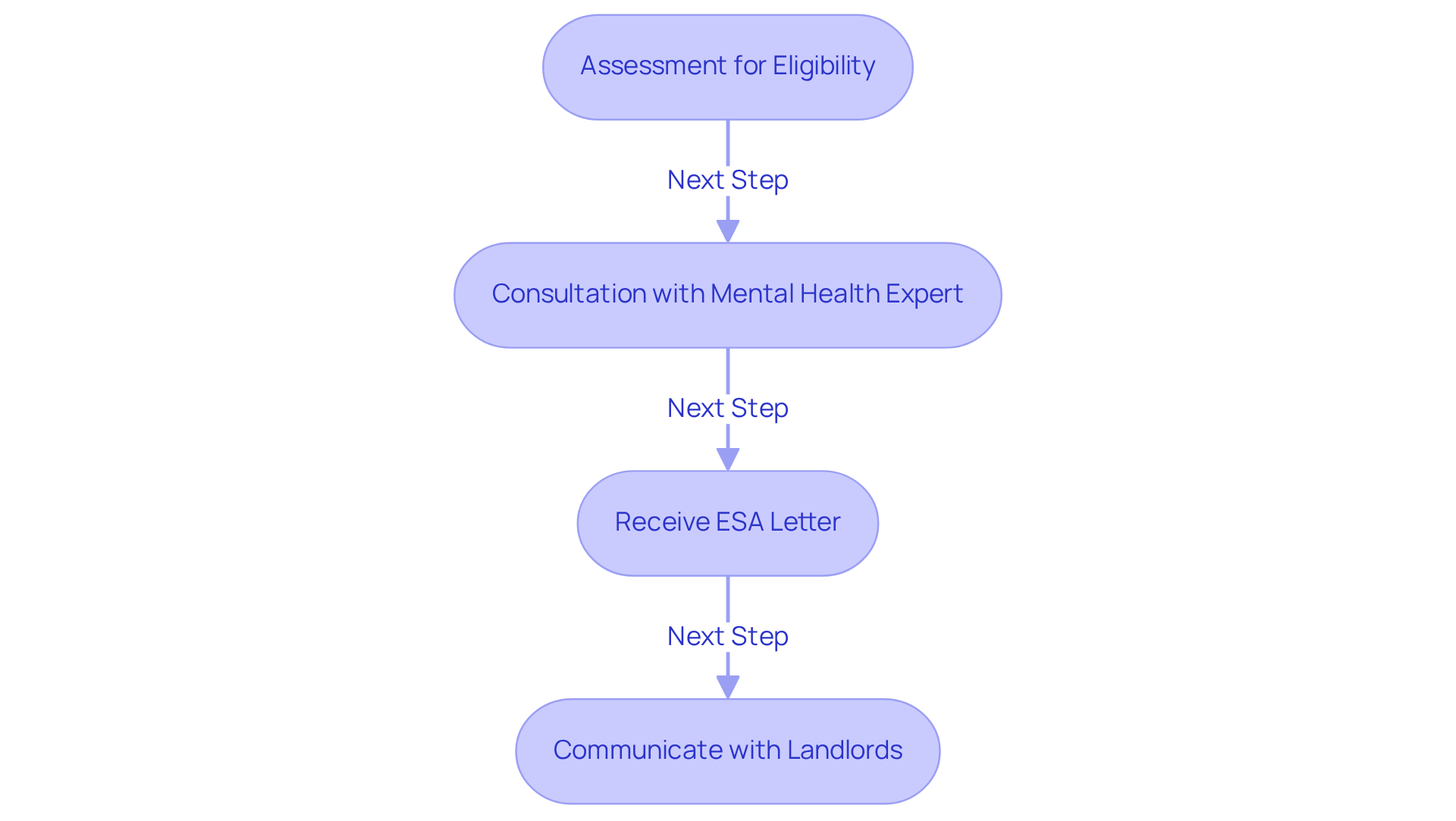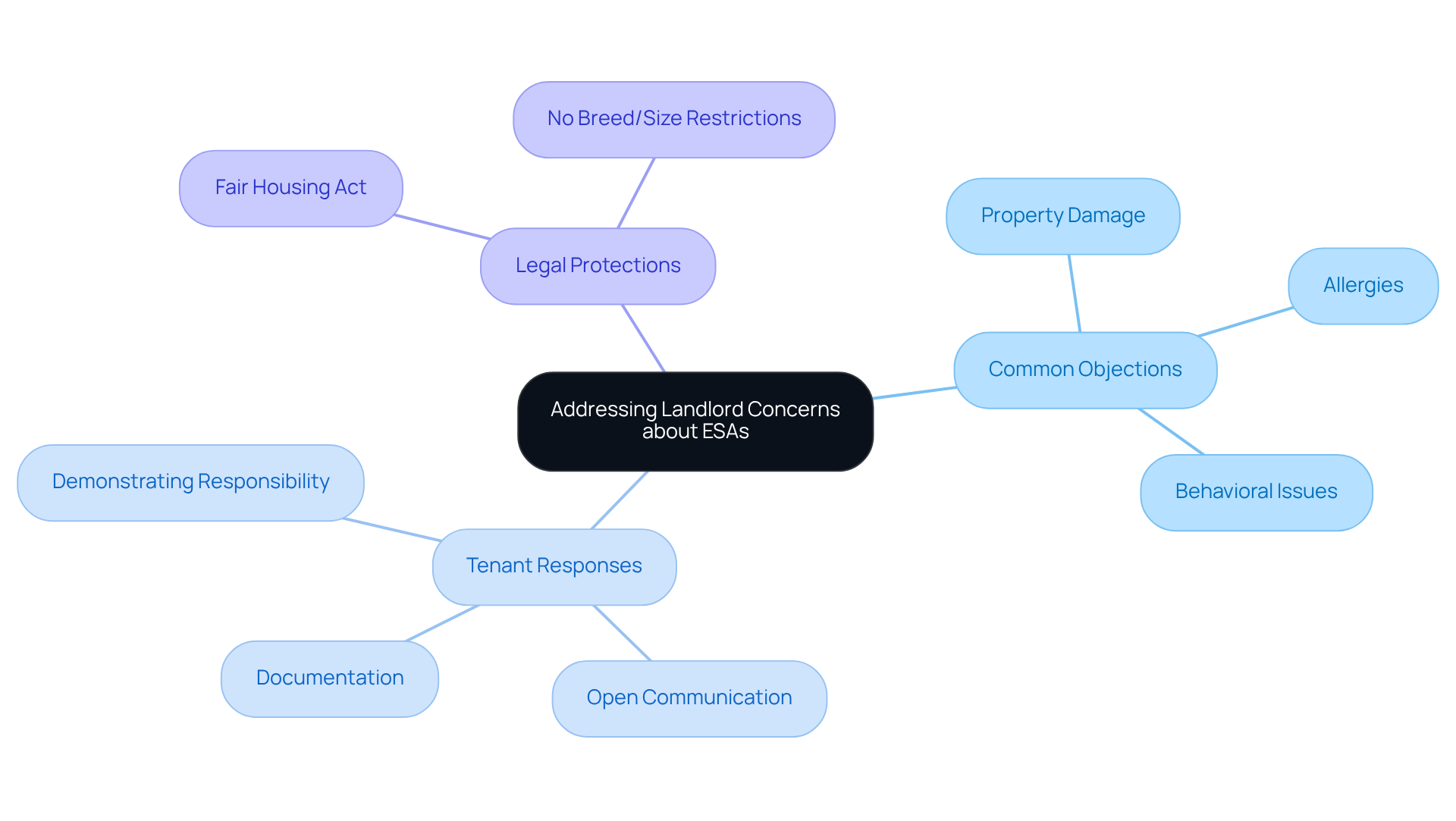

ESA Rent: Essential Steps for Securing Your Emotional Support Animal
by Lena Park
Last updated: July 9, 2025
Verified and Approved by:
Angela Morris,
MSW, LCSW
Fact Checked

Overview
This article highlights the vital steps for securing an Emotional Support Animal (ESA) in housing, while emphasizing the legal rights and processes involved. It compassionately acknowledges the emotional challenges faced by individuals with mental health issues, and how the Fair Housing Act serves to protect tenants requiring ESAs. The importance of obtaining proper documentation from mental health professionals is underscored, as it acts as a supportive solution in navigating these challenges.
Furthermore, the article offers strategies for effectively communicating with landlords, addressing common concerns and objections in a nurturing manner, ensuring that individuals feel empowered and supported throughout the process.
Introduction
Navigating the complexities of securing housing with an Emotional Support Animal (ESA) can indeed feel overwhelming, especially for those grappling with mental health challenges. These beloved companions are not just sources of comfort; they play a vital role in enhancing emotional well-being, making their presence in housing situations indispensable. Yet, the legal landscape can be daunting, and potential objections from landlords may add to the stress.
What steps can tenants take to ensure their rights are respected while nurturing a supportive living environment for themselves and their ESAs? This journey, while challenging, can lead to a more fulfilling and comforting home life.
Define Emotional Support Animals and Their Role in Housing
Emotional Support Animals (ESAs) are cherished companions that provide essential comfort and assistance to individuals navigating the challenges of mental health difficulties. Unlike service animals, which are specifically trained to perform tasks for those with disabilities, ESAs primarily offer companionship and emotional stability. Their presence can significantly alleviate feelings of anxiety, depression, and loneliness, making them invaluable for those who depend on their pets for emotional well-being.
In housing situations, esa rent allows individuals with mental health conditions to live alongside their beloved pets, even in places that typically restrict such companions. This legal accommodation, which includes esa rent, is crucial for fostering a supportive living environment, allowing tenants to advocate for their rights under the Fair Housing Act. Understanding the definition and role of emotional support animals, along with the legal rights associated with them, is the first step in effectively navigating housing regulations and ensuring access to the emotional benefits these animals provide.
At Wellness Wag, we are dedicated to empowering individuals through accessible Emotional Support Animal Letters. These letters serve as a supportive solution, helping you navigate your journey toward a brighter, more fulfilling life. Remember, you are not alone in this journey; we are here to support you every step of the way.

Explore Legal Protections for ESA Tenants Under the Fair Housing Act
Navigating life with a disability can be challenging, especially when it comes to finding suitable housing. The Fair Housing Act (FHA) provides essential protections for individuals with disabilities, including those who require esa rent for their Emotional Support Animals (ESAs). This legislation ensures that landlords must provide reasonable accommodations for tenants needing assistance from an ESA rent, meaning they cannot deny housing based solely on this necessity. It’s important for tenants to understand that documentation from a licensed mental health professional is often required to validate their need for an ESA.
At Wellness Wag, we’re here to help simplify this process. We connect you with a licensed medical doctor for a personalized consultation and thorough evaluation to assess your eligibility for an ESA. Once confirmed, you’ll receive a professionally crafted ESA letter, recognized by law, within 24 hours of your consultation. It’s crucial to note that landlords cannot refuse an esa rent based on breed or size, as long as the animal is recognized as an emotional support entity. Additionally, they cannot impose extra fees for esa rent, as ESAs are not classified as pets.
This legal framework not only safeguards the rights of individuals facing mental health challenges but also promotes a more inclusive housing environment. In 2021, a staggering 31,216 fair housing complaints were filed, with a significant number related to disability discrimination. This highlights the importance of understanding and asserting your rights. Clear communication and proper documentation are vital for successful accommodation requests, ensuring that you can live harmoniously with your support animal.
Legal experts emphasize the need for tenants to be proactive in upholding their rights under the FHA, particularly when navigating potential challenges from landlords regarding ESA verification and accommodation requests. Remember, you’re not alone in this journey. Start your path to securing your ESA letter today with Wellness Wag, where we care about your well-being and are committed to supporting you.
Navigate the Process of Securing ESA Documentation and Communicating with Landlords
Navigating the path to obtaining ESA documentation can be challenging, especially for those grappling with mental health issues. It begins with an assessment to determine eligibility, often involving a consultation with a licensed mental health expert. This compassionate professional takes the time to understand the individual’s mental health needs and how an Emotional Support Animal (ESA) can play a vital role in their treatment strategy.
Upon receiving approval, the professional issues an official ESA letter. This important document outlines the individual’s diagnosis and the necessity of the animal for emotional support. With this letter in hand, effective communication with landlords about ESA rent becomes crucial. It’s essential to present the ESA rent documentation clearly, explain the legal protections under the Fair Housing Act, and openly address any concerns the landlord may have about the animal’s presence in the property.
It’s heartening to note that statistics reveal 73% of ESA owners rate their pets’ effectiveness in improving mental health as eight or higher on a scale of ten. This underscores the significant role these animals play in enhancing well-being and providing comfort. Mental health professionals emphasize that a well-prepared approach can ease discussions with landlords, empowering individuals to advocate for their rights while fostering understanding and cooperation.
Reflect on your own experiences—how might having an ESA support you during tough times? Remember, you are not alone in this journey. With the right support and documentation, you can navigate these conversations with confidence and compassion.

Address Common Challenges and Objections from Landlords Regarding ESAs
Landlords often express concerns about Emotional Support Animals (ESAs), citing potential property damage, allergies, or behavioral issues as primary objections. These worries can feel overwhelming for tenants who rely on their ESAs for emotional support. To address these challenges compassionately, tenants are encouraged to proactively prepare their responses. Sharing documentation about the animal’s training, behavior, and any pertinent certifications can greatly ease landlord concerns, fostering understanding and connection.
It’s important to remember that under the Fair Housing Act, landlords cannot impose breed or size restrictions on ESA rent, provided that the animal is considered necessary for emotional support. This legal protection can be a source of reassurance for tenants. Open communication is key; tenants should engage in discussions with landlords to clarify any misconceptions and demonstrate their commitment to responsible pet ownership.
By fostering a collaborative relationship, tenants can enhance their chances of securing housing accommodations while ensuring their emotional support needs are met. This supportive approach not only helps in navigating the complexities of housing but also reinforces the vital role ESAs play in the lives of those who need them. Together, through understanding and compassion, a positive outcome can be achieved.

Conclusion
Navigating the complexities of securing housing with an Emotional Support Animal (ESA) can be a deeply personal journey for individuals facing mental health challenges. Understanding the legal protections under the Fair Housing Act is crucial, as it safeguards the rights of tenants to live with their ESAs. Recognizing the essential role these animals play in providing emotional stability allows individuals to advocate more effectively for their needs, fostering a supportive living environment.
Many individuals struggle with obtaining the necessary documentation from a licensed mental health professional, and communicating effectively with landlords about ESA rights can feel daunting. It’s important to acknowledge the common challenges tenants may encounter, such as landlord objections regarding property concerns. However, through open dialogue and proactive preparation, these issues can be addressed. Empowering oneself with knowledge not only helps assert rights but also encourages a collaborative relationship with landlords.
Ultimately, the journey to securing an ESA and navigating housing regulations transcends mere legal compliance; it is about enhancing well-being and nurturing a sense of belonging. Taking proactive steps, seeking support, and advocating for one’s rights are vital in ensuring that emotional support needs are met. By doing so, individuals can create a nurturing living space that truly acknowledges the significant benefits that Emotional Support Animals provide. Remember, you are not alone in this journey, and there is support available to help you along the way.
Frequently Asked Questions
What are Emotional Support Animals (ESAs)?
Emotional Support Animals (ESAs) are companions that provide comfort and assistance to individuals facing mental health challenges. They primarily offer companionship and emotional stability rather than being trained to perform specific tasks like service animals.
How do ESAs help individuals with mental health difficulties?
ESAs can significantly alleviate feelings of anxiety, depression, and loneliness, making them invaluable for individuals who rely on their pets for emotional well-being.
What is the importance of ESA rent in housing situations?
ESA rent allows individuals with mental health conditions to live with their pets in housing situations that may typically restrict animals. This legal accommodation is essential for creating a supportive living environment.
What legal rights do individuals with ESAs have under the Fair Housing Act?
Individuals with ESAs have the right to advocate for their needs under the Fair Housing Act, which supports their ability to live with their emotional support animals in housing that usually prohibits pets.
How can Wellness Wag assist individuals seeking ESAs?
Wellness Wag provides accessible Emotional Support Animal Letters, which help individuals navigate their journey toward emotional well-being and ensure they can live with their ESAs.
Certify Your Emotional Support Animal Today

Why You Can Rely on Us?
At Wellness Wag, we believe your pet deserves care rooted in both science and compassion. Each article is carefully researched, written in clear language for pet owners, and then reviewed by qualified professionals to ensure the information is evidence-based, current, and practical for real-life care. Our goal is to help you feel confident in making informed decisions about your pet’s health and well-being.
Reviewed by
Angela Morris, MSW, LCSW
Angela is a licensed clinical social worker with 20 years of experience in patient advocacy and community mental health. She has assisted numerous clients with ESA evaluations and brings a deep understanding of disability accommodations, ensuring that all information is accurate, supportive, and practical.

Written by :
Lena Park
Last Updated :
July 9, 2025












